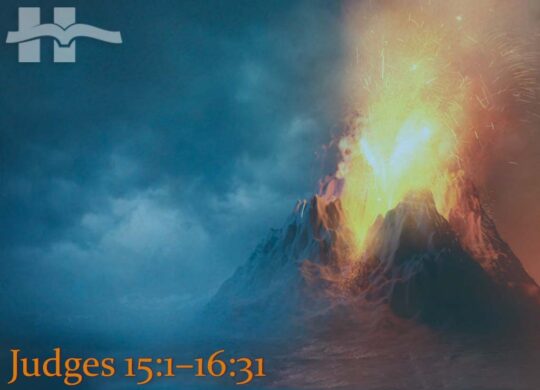Judges 15:1–16:31

Rebellious disdain of one’s divine calling, expressed in uncontrolled lusts and vengeful actions, can lead to destruction.
At some unspecified time in the recent past, Samson, in a rage, had abandoned his wife (14:20). Now he wants sex—“I will go in to my wife”—and so he decides to make amends. Bearing a goat’s kid (like a box of chocolates, I suppose?), Samson proceeds to his wife’s house (15:2) where he is told that she has been given away to one of his companions (14:20; 15:2, 6). Unrequited desire now becomes inflammatory fury. Samson turns violent: capturing three hundred foxes, preparing a hundred and fifty torches, uniting the feisty animals tail to tail with appropriately placed torches, he releases the foxes (truly weapons of mass destruction!)—and all of this without any help whatsoever. He wreaks incendiary havoc on the Philistines’ agroeconomy and their inventory of staples: grain, grapes, and olives (15:4–5). The collateral damage of Samson’s blitzkrieg is that the Philistines blame his wife and father-in-law for the fiasco and burn both of them alive (15:6).
Of course, Samson is not going to let that go by without reacting. His intent to avenge himself (15:7) tells the reader about his total lack of understanding of the consequences of tit-for-tat operations. A personal vendetta waged over a woman has now exploded into an international conflagration (15:10–11). And so the vicious cycle continues to spiral out of control. Somewhere along the way, he also slaughters a thousand Philistines with a donkey’s jawbone (15:15–16). What an appetite for violence and revenge, and sex.
Talking of which …. He engages a Philistine prostitute in a one-night stand (16:1–3) in a Philistine city, Gaza. All his trysts with women have only brought Samson peril thus far. Had he not learned that he was weak without Yahweh’s help and strength (15:18–19), and had he not perceived that his thirsts could only be quenched by trusting Yahweh, not by haunting brothels? Like Israel, hardhearted and stubborn, Samson, too, had forgotten his calling, and had lapsed into an anti-Yahwistic pattern of life.
But we’ll cut to the chase. He falls in love with another woman, Delilah (16:4).
And this special, fourth lady’s name? “Delilah.” In Hebrew, layla means night. So “Delilah” is the Night Woman. Our man, Sunny Boy, and the Night Woman. For some reason, I’m not getting a good feeling about this.
Well, Philistine rulers bribe Delilah to discover the secret of Samson’s strength. Three times she tries; three times he bluffs her. Finally the fourth time, he caves in, tells the truth and gets his haircut—the last of his Nazirite commitments.
Hey, why not? I’ve already consumed alcohol, contacted unclean things, and touched corpses? Why not get a haircut, too? Who cares for God?
He didn’t want to be special. He didn’t want to have anything to do with Israel. He didn’t want to be a Nazirite. He didn’t want to be a judge. He didn’t want any truck with God. A renunciation of his calling. A repudiation of his dedication. Defection!
The rest is history. He is captured. His eyes are gouged out. He who wanted whatever he saw was good in his eyes, now loses the very organs of his downfall. Samson is left without strength, without sight, without freedom, without dignity, and—worst of all—without God (16:20)!
Later as the Philistines parade him at a festival, he manages to—literally!—bring the house down, killing himself and a whole bunch of enemies (16:25–30). The first judge of the book to die in an enemy encounter.
Sunny Boy’s sun had set. And Israel was now in darkness, and there is no rest for the land. All that remains in the book is gross idolatry and a violent civil war.
[For more details, see my Judges commentary.]












 Abe Kuruvilla is the Carl E. Bates Professor of Christian Preaching at The Southern Baptist Theological Seminary (Louisville, KY), and a dermatologist in private practice. His passion is to explore, explain, and exemplify preaching.
Abe Kuruvilla is the Carl E. Bates Professor of Christian Preaching at The Southern Baptist Theological Seminary (Louisville, KY), and a dermatologist in private practice. His passion is to explore, explain, and exemplify preaching.